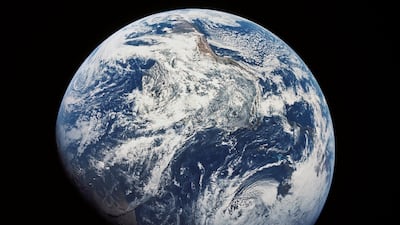Life on Earth, and its origins, is one of the great mysteries of science, but new research could change our understanding.
The planet we call home came into being 4.5 billion years ago, with the earliest life understood to date back to about 3.7 billion years ago. But there is growing support for the idea that suitable conditions could have existed significantly earlier.
Among the evidence for this is a recent study from Dr Hamed Gamaleldien, an assistant professor in Earth sciences at Khalifa University in Abu Dhabi, who has "pushed the line back" by 500 million years.
an assistant professor in Earth sciences at Khalifa University in Abu Dhabi
Central to Dr Gamaleldien’s research, published in Nature Geoscience this month, are tiny crystals of a mineral called zircon, which can survive, even when the rocks in which they originally existed have worn away.
In the study, "Onset of the Earth's hydrological cycle four billion years ago or earlier," Dr Gamaleldien and his co-researchers analysed samples from the Jack Hills, Western Australia, which has some of the oldest rock material in the world.
They looked at the ratio of different forms of oxygen, known as isotopes, in well over 1,000 zircon crystals, looking specifically for oxygen 16 – which is found more prominently in freshwater than seawater.
"We found a new result," Dr Gamaleldien told The National. "At four billion years ago we found zircon has a lot of light oxygen – oxygen 16."
The result indicates that around four billion years ago fluid or semi-fluid rock material called magma came into contact with freshwater, a crucial clue about conditions on Earth back then.
If there was freshwater present, Dr Gamaleldien said, the Earth is likely to have had some dry land rather than being completely covered by ocean, which could change the current understanding of the planet’s composition at that time.
"What is the main ingredient for the formation of life? It is mainly the presence of freshwater and the land above the sea level," he said.
"We push back the line by 500 million years because they believed life began at 3.5 billion years ago."
Breaking new ground
The new research, co-authored by scientists from Curtin University in Australia and a number of institutions in China, is "remarkable and exciting", Dr Henry Gee told The National.
Dr Gee, author of A (Very) Short History of Life on Earth and a world-leading expert on the origins of life on our planet after a decades-long career as a senior editor of the scientific journal Nature, said Dr Gamaleldien's study "fits into an emerging picture".
"Getting a good picture of the very early Earth is of course very difficult, so it’s always great to have any titbit of new information from that incredibly remote period when the Earth was very different," he said.
"The earliest life that everybody can agree about is about 3.7 billion years ago. Even then there’s a bit of dispute.
"But certainly by 3.4 billion years ago there were these enormous reefs. Not coral reefs – these are reefs made out of bacterial accumulations. Already life was bubbling away a billion years after the Earth formed."
Previous research involving zircons from Western Australia has hinted that life may have developed as far back as 4.1 billion years ago.
Analysis of graphite, a form of carbon, within zircon crystals offered clues as the crystals had a higher ratio of carbon 12, an indicator that living organisms were present, than they did of carbon 13.
Such analysis is not definitive evidence, Dr Gee indicated, but it hints that life was present.
"There’s a lot of suggestive evidence that there were suitable habitats for life more than four billion years ago. It could have been in the deep sea, it could have been in freshwater – that would have been pretty remarkable," he said.
"Everything points to life forming incredibly quickly after the Earth formed."

Evidence of alien life next?
Dr Gee also said that the speed in which living organisms emerged on Earth suggests that the process is not unique to this planet.
"If there is a watery Earthlike planet I think it would be strange not to find it [life]," he said. "It probably won’t be that long before we find evidence on other planets.
"That will probably be the form of evidence of gases in planets that don’t appear in any quantity unless they’re being constantly replenished by life. Gases such as molecular oxygen."
Such information may come from data collected by Nasa’s James Webb Space Telescope, which is already yielding fascinating information about the gases present in the atmosphere of exoplanets, which are planets that orbit stars outside our solar system.
Dr Gamaleldien and his colleagues, meanwhile, are set to analyse more rocks dating up to around four billion years old, this time from Canada and Greenland.
Samples have already been collected by Dr Gamaleldien’s colleagues, although he may make a trip to the locations next year to look for suitable material.
"Maybe life began earlier than we thought," he said. "Maybe our planet was inhabited at this time. We don’t know. But we are sure we have freshwater there, we have land there at this time. Why not, maybe life started at this time."
Climate tipping points - in pictures








